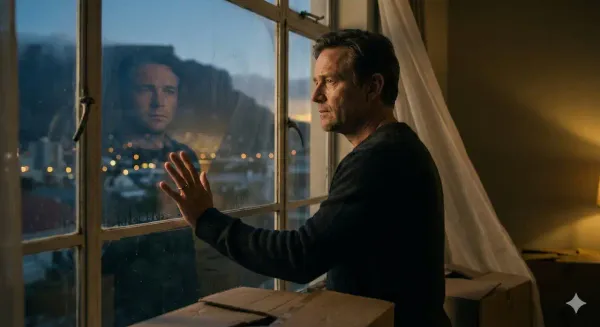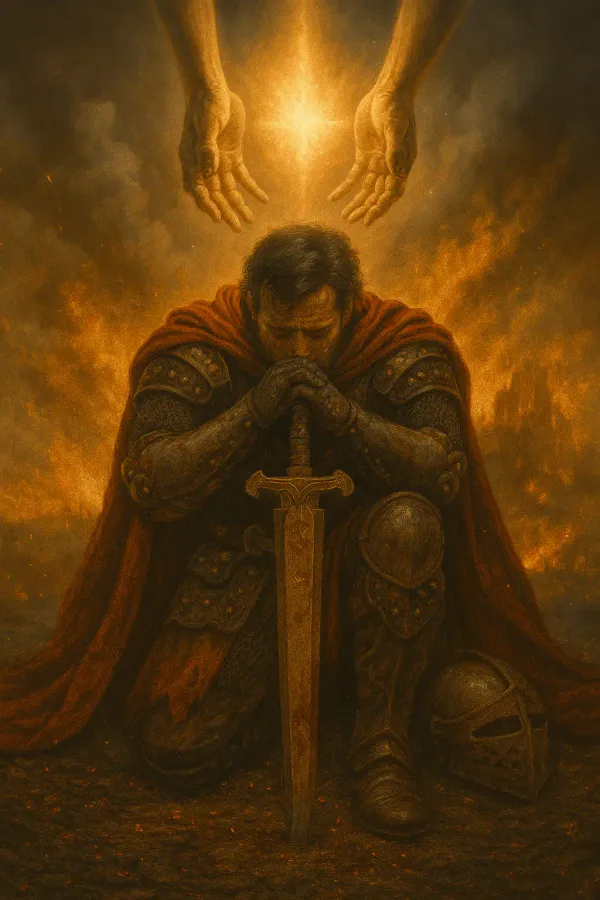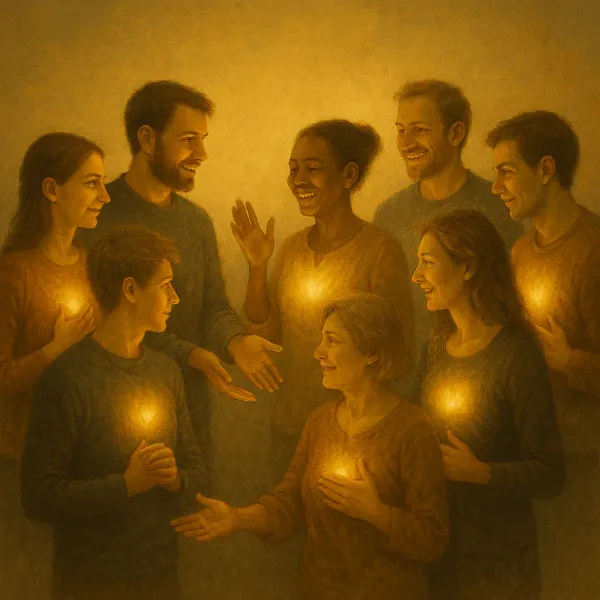Pillars
Shame doesn't wait. It climbs into my bed before dawn, whispering the oldest lie: "You can't let them see." By breakfast, I've lost a battle no one else knows I'm fighting. The pillars I think hold me up—pride, control, image—are cages, not strength.
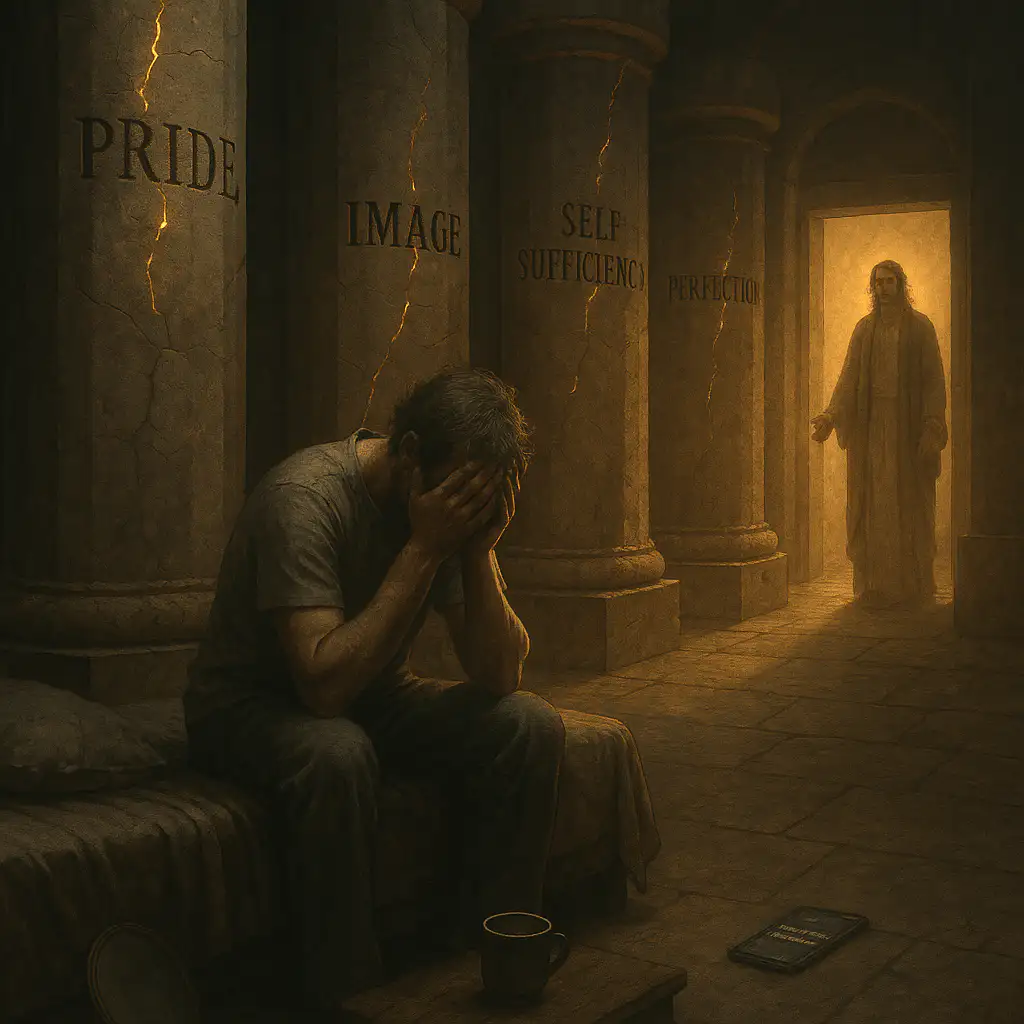
Shame doesn’t wait. It climbs into my bed in the dark before my alarm. It waits to whisper before I’ve even opened my eyes. It does not sit quietly in a corner waiting for me to notice it.
It works. It studies me. It waits for the right moment to dress itself as wisdom, self-protection, even righteousness.
And when it finds that moment, it whispers the oldest line in the book:
You can’t let them see.
In that moment, the pillar I think is holding me up — conviction, reason, “principle” — is already compromised. It is no longer bearing the weight of truth. It is holding up the façade I’ve built to survive exposure.
By breakfast, I’ve already lost a battle no one else can see.
Let me name some of my own pillars. The belief and identity clusters I’ve wrestled with, still wrestle with … and the Words He says to me when I stop to listen.
Pride
Pride tells me I’m fine. That strength is the absence of weakness. That my worth is measured by how little I need from anyone else. I used to proudly state, “You can drop me off in the middle of Russia and I’ll figure a way home”. How naive and arrogant.
The thoughts line up neatly in my mind — “I’m protecting my ‘character’. I’m fine, I don’t need any help. If you want something done properly, do it yourself.” — but beneath them, my head mutters a different truth: If I admit I don’t know, the ground will shift under me. I’ve built my worth on being the one who figures it out, who comes through when others fail. If they see I’m lost, they’ll stop trusting me — and without that trust, I don’t know who I am. Better to bluff, overwork, or overtalk than to stand exposed as ordinary. What are yours?
And my heart?
I am terrified they’ll find out I’m winging it. Every success feels temporary, every compliment one step closer to the moment they see the cracks. I wish I could rest, but rest feels like the luxury of the secure. If I stop proving myself, I’ll disappear.
It’s here He steps closer, not with condemnation but with eyes that know.
“You’ve carried this weight long enough. Pride is no armour; it’s a cage. You think you’re keeping shame out, but you’re locking yourself in.”
When pride’s cage cracks, I glimpse freedom, yet the mirror of self still beckons. Paul’s thorn in the flesh lingered, not to shame him, but to keep him tethered to grace (2 Corinthians 12:9). So too, my instinct to craft an image rises—a mask to shield the heart still learning to rest in His sufficiency. But in the body, where we are known as His, the façade begins to falter, and I wonder: what face do I wear to hide from His gaze?
Image
The sun hasn’t risen yet, the phone is buzzing on the bedside table and the alarm is urging me to action. I take a deep breath and rehearse the confidence I’ll need to wear today, the version of me that feels safe enough for the world to see. My shoulders tighten; I hear the lie that says, keep it together, or they’ll see your weakness.
And then He is there. Not demanding, not rushing — standing in the doorway of my mind, unhurried. His eyes are steady, His voice quiet enough to land where my fear trembles. “I know how heavy it is to hold yourself together.”
“The face you hide,” He says, “is the face I love. Let the light you fear be the light that heals.”
I cancel the alarm, put the phone down. Go and wash my face slowly with ice cold water, thinking, Here is my real face. Later, with hands still damp, I send one honest line to a friend: I’m not ok today. Could use prayer or coffee. A small act, but already the lie wobbles under the exposure. The mask slips. And His light begins to do its work.
My wife calls out in the dark, “You’ve got this!”, as I step out into the day, the pillar has shifted some. I press play on my “Project of Love” Spotify playlist and reverse the car out into the road, headlights shining into the dark road ahead.
Stepping out from behind the mask, I feel His light touch my raw edges, yet my hands still reach for control. James warns that the tongue, small as it is, steers the whole body (James 3:4–5), and my plans, like words, seek to direct my days away from uncertainty. But in Christ’s body, where each member yields to the Head, I’m invited to loosen my grip.
Can we trust the One who holds the stars to hold our hours?
Control
I grip the edges of my calendar like it’s a steering wheel. Everything colour-coded, every box filled. If I can just anticipate, just manage, maybe nothing will blindside me. I rewrite the emails, hedging, covering every angle. Yet my jaw is tight, sleep shallow, heart always bracing for the thing I didn’t anticipate, waiting for the other shoe to drop. You ever have that feeling?
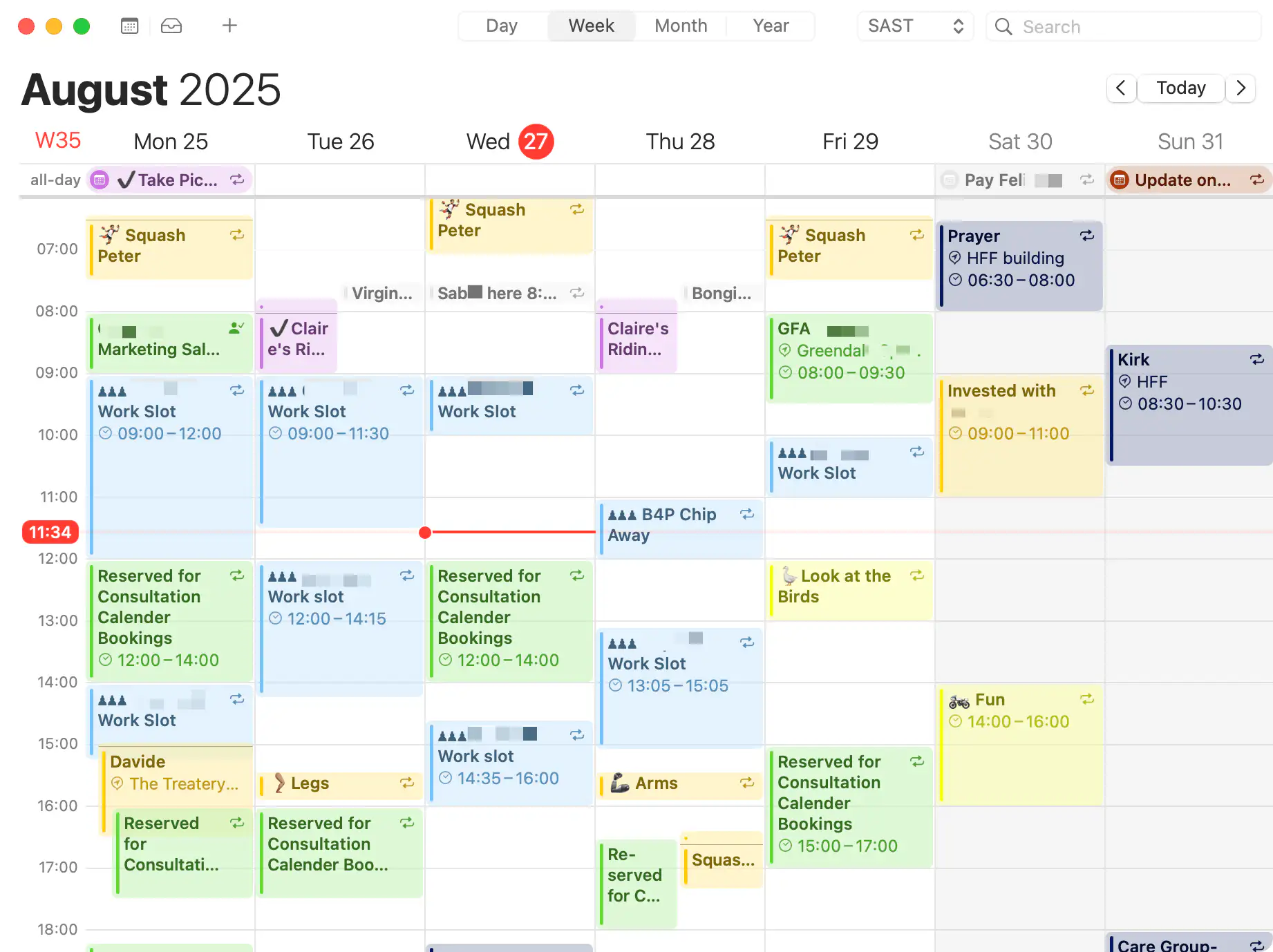
He interrupts my tension with a story of lilies clothed without striving, sparrows fed without barns. He tells me to look at the birds. His tone isn’t scolding; it’s almost playful.
“You don’t need to be the one holding the universe together. That’s already handled.”
I exhale, jaw relaxing. One small surrender: I push aside a block of time marked urgent and write look at the birds. Another and write fun. It feels reckless. It also feels like trust.
Releasing my calendar to His care feels like freedom, yet my mind races to fortify itself with knowledge. Paul’s thorn taught him that strength lies not in answers but in weakness made perfect through Christ (2 Corinthians 12:9). In the body, where truth is a Person and not a fortress, I’m called to rest in knowing Him, not in mastering facts.
What if our doubts are doors, not walls?
Knowledge
I’ve stacked knowledge like bricks, mortared them with experiences, verses and citations. I’ve built a tower high enough to keep my doubts and weaknesses from ever being seen. From the outside, it looks strong. Inside, it’s hollow, damp and cold.
He sat long, patiently at the foot of my structure and waited. For years. Not challenging my constant seeking, logic, my endless study — one day He simply asked,
“What are you afraid will happen when you can’t keep up building?”
The question rattled louder than any sense of security my tower brought.
Then I realised: truth is a person, not a defence. A person who dined with the broken, with doubters and welcomed questions. I’ve recently stepped outside the walls, breathed the fresh air and felt the sun on my face. It was dark and cold inside. Now, trusting, I’m more willing to say,
“I don’t know”.
Embracing “I don’t know” opens my heart to His mystery, but my hands still clutch at safety. The apostles knew shipwrecks and prisons, yet sang of a kingdom unshaken (Acts 16:25; Hebrews 12:28). In the body, where His name is our strong tower (Proverbs 18:10), we’re invited to rest not in our plans but in His provision.
Can we lock our fears in His hands instead of our own?
Security
I cling to numbers in the bank app, scan locks twice before bed, clutch tight to the illusion that if I plan enough, I’ll be safe enough. But in the quiet, the fear hums: It’s never quite enough., the voice questions, “Have you …? What about …?”. I usually have, but check again, consider another angle, just in case.
He tells me of birds without vaults and children who sleep without fear. His gaze is steady as He says,
“Your Father knows. Before you ask, He knows. And He is not stingy with His love. His name is a safe tower, the righteous run into it and are safe, call out to Him”.
It’s not that the locks vanish, that relationships are instantly healed or the bills pay themselves. My fingers unclench from the phone and I slide it face-down on the nightstand and breathe:
You know.
You see.
You hold me.
I run into You and I’m safe.
My heart loosens just enough to rest, His rest. More-so as the decades pass and I witness His faithfulness in the storms.
Resting in His tower frees my heart from fear’s grip, yet I still scan the crowd for belonging. Jesus washed feet, calling the unseen His own (John 13:14–17), showing that love, not approval, binds the body. In His embrace, I’m invited to stop reshaping myself for others.
What if we are already home in Him?
Belonging
In every room I enter, I scan for cues:
Am I welcome here?
Am I wanted?
Do I matter?
I shape myself like clay to fit, fearing the rejection if I don’t.
My head justifies … If I question my tribe, I lose my covering. The group has been my anchor, my identity — even when it’s wrong, it’s safer to stay. Stepping away would mean starting over, explaining myself, maybe being shunned. I’d rather twist the truth than be cast out.
And my heart cries … If they reject me, I have nothing. I don’t know how to belong without them. I can stomach hypocrisy, compromise, even injustice, as long as I’m not alone in the dark. I’m scared that without the group’s approval, I’ll vanish into irrelevance.
But He kneels where no one else did, washing feet dusty with rejection. He lifts His eyes and says,
“I chose you. Not when you were impressive, but when you were unseen, lost in your sin. I don’t call you servant — I call you son.”
The words undo me. They are not theory. They are belonging. Real enough that, for once, I don’t need to adjust myself to be accepted.
His voice calls me son, yet pain whispers I must hide to survive. James reminds us the tongue can bless or curse (James 3:9–10), and my silence curses my own wounds by burying them. In the body, where scars are shared and not shamed, His wounds invite mine to breathe.
Can we let pain speak in the light of His love?
Pain
I’ve learned to tuck pain away. Smile when asked, deflect when pressed, keep moving. To stop would be to drown.
He doesn’t shout over the silence. He shows scars in His hands, side, feet — evidence that pain doesn’t disqualify love, it becomes the place where love proves itself.
“I won’t waste your wounds,” He says gently. “Let them breathe. Let them testify.”
I share my pain with a brother. The tears moisten my eyes, not as weakness but release. Pain is still here, but it’s no longer hidden. It’s shared. And in this sharing, it begins to heal.
The Shaking of the Pillars
Here’s the thing: you can hold your head high and keep your heart hidden for a long time. You can out-manoeuvre the people who challenge you. You can even keep leading, teaching, “serving.”
But the hidden, unexposed heart will find ways to betray you. Through cynicism and pride that leaks into every conversation. Through an inability to celebrate others without quietly diminishing them. Through gossip or a slow withdrawal from people who might see through the act.
And when the collapse comes, it won’t be because you lost the argument. It will be because you never opened the door to be healed, truly seen.
Yet in the body of Christ, we are not meant to shake alone—Paul reminds us that
Speaking the truth in love, we are to grow up in all aspects into Him who is the head, that is, Christ, from whom the whole body, being fitted and held together by what every joint supplies, according to the proper working of each individual part, causes the growth of the body for the building up of itself in love.
— Ephesians 4:15–16, (NASB95)
Shame’s fracture thrives in solitude, but shared light—truth tenderly voiced among brothers and sisters—restores the bonds, amplifying our collective becoming as we bear one another’s burdens and so fulfil the law of Christ.
In the quiet unraveling of these hidden strongholds, we glimpse a truth that turns the world’s wisdom on its head. To expose our fractures not in isolation but in the tender light of the body—where vulnerability becomes the pathway to strength, and confession the doorway to wholeness—feels utterly counter-intuitive, a surrender that defies self-preservation.
Yet this is the way of the cross, His way: the King who laid down power to embrace weakness, inviting us into a kingdom where the last are first, and dying to self births true life. As we walk this upside-down path together, we find not defeat in the shaking, but the merciful reshaping of our hearts into His image.
Weapons for the Battle
The Apostolic writings call this warfare, but not the kind you wage with clenched fists, grit or sharper arguments. These weapons aren’t forged from flesh. They are quiet, steady, daily choices that seem too small to matter — until they topple the fortresses in your mind.
Confession is one. Dragging the hidden thing into the light, whispering it aloud to God, sometimes to a trusted friend.
Thanksgiving is another. Naming gifts when my heart insists there are none. Gratitude loosens fear’s grip on control and security.
These tools gain their true power not in isolation, but in the bearing of burdens together—as Galatians 6:2 calls us to fulfil Christ’s law by carrying one another’s loads. What begins as an individual whisper of confession becomes a collective strength, each not only carving our own hearts but fortifying the whole body against shame’s siege.
Scripture itself — not as a stockpile of verses to hurl, but as words lived, chewed, prayed, sung in the dark until they become marrow.
Prayer. Not just lists, but honesty, groans, silence when words fail.
Worship. Not mood music, but the stubborn act of turning my gaze from myself to the One who already knows and still stays.
And love — perhaps the most foolish weapon of all. Choosing to forgive, to bless, to reach out, to carry burdens. The very thing that seems least effective is what breaks the cycle of shame most powerfully.
These are not quick fixes. They are slow chisels. They shape space for His Spirit to topple strongholds that facts and willpower never could.
Confronting the Pillars
If I strip away the theology, the ‘reputation’, the decades of carefully maintained self-story, what’s left? Can I stand bare before God and say, “Search me, and know my heart” — not just my doctrine, not just my work, but my heart?
If not, then the pillars I’ve leaned on are not truth. They’re fear in masquerading as truth. And God, in His mercy and kindness, will shake them until they fall.
Better to dismantle them now — lie by lie — with confession, humility, and the courage to let my heart be corrected before my mind can explain it away.
And in the rubble, something astonishing happens: the arms I thought would punish are the ones that catch me. The voice I feared would condemn is the one that calls me beloved.
That’s when I know the pillars were never my foundation. He was. He is. He always will be.
Seven Weapons for the Pillars
- Confession → breaks pride (James 5:16).
- Surrender → loosens control (1 Peter 5:6).
- Truth → questions fortresses (John 8:32).
- Authenticity → rips off the mask.
- Thanksgiving → silences comparison.
- Forgiveness → releases resentment.
- Honesty → exposes self-deception.
They are not lofty concepts. They are a few of the practices I reach for, in the thick of shame’s whispers. Not to prove I’m strong, but to stay close to the One who is.
These are some of my pillars, what are yours, your tribes?
Can you, will you name them? Now, today?
Prayer
Jesus, meet me here in my mess.
Pull down the pillars I’ve leaned on that keep me from You and others.
Give me courage to confess, to surrender, to choose honesty over hiding.
Help me to forgive when I’d rather cling to pain.
Clothe me with Your kindness when my pride burns hot.
And when I am afraid, whisper again: “I am with you.”
Next. Tearing down is only the first mercy. What He builds in the ashes — that’s where hope flourishes.
